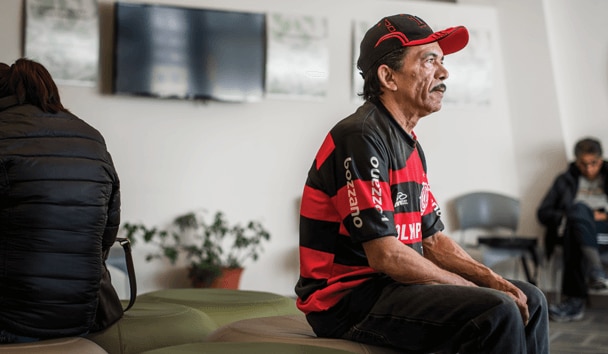
When Julio first came to Arlington Free Clinic (AFC) outside Washington, D.C., he was on crutches. His foot had swelled from diabetes-related complications from an injury suffered from his work as a day laborer. A recent immigrant, he’s determined to escape the fate of his father, who died of diabetes-related complications in Honduras.
Today, Julio’s diabetes is under control. So is his cholesterol, which he hadn’t known was high until he visited the clinic. And though he still can’t work due to the injury, he knows he can still access the medications and treatment he needs at no cost to him through the clinic. “Thank God the clinic is here for me,” he says. “I don’t know where I’d be without it.”
Supporting free and charitable clinics
AFC is one of more than 1,200 free and charitable clinics around the country that serve people who are uninsured, underinsured, or have limited access to care. These clinics operate with little or no state or federal funding and utilize a volunteer/staff model to provide a wide range of medical, dental, pharmacy, vision and behavioral health services to the economically disadvantaged.
In February 2018, the CVS Health Foundation announced $1 million in new grants to 49 free and charitable clinics across the country, including $20,000 to AFC. The latest grants bring the Foundation’s total contribution to free and charitable clinics to more than $4.5 million since 2015, supporting increased access to quality care as well as chronic disease management and prevention.
Over the last two years, free and charitable clinics have experienced a 40-50% increase in patient demand, but donations have declined by 20%, according to the National Association of Free & Charitable Clinics.
AFC has to use a monthly lottery to provide patient appointments. There is such a huge demand that almost half of the patients can’t get an appointment that month. Patients who come a second and third time get multiple entries into the lottery to ensure they can see a clinician.
AFC patients can access dozens of medical specialties under one roof, thanks to a network of more than 500 volunteers. “There’s something very gratifying about taking care of people who need your care, but couldn’t afford it otherwise,” says Dr. Ian Shenk, a gastroenterologist who volunteers for AFC. Dr. Shenk, now retired, long provided charitable care in his practice. But he says the clinic’s resources allow him to serve patients in a more comprehensive way.
It’s long been documented that poor and marginalized people face greater obstacles to health and wellbeing. At AFC, a CVS Health Foundation grant funds Community Bridge, a program that addresses non-medical factors that influence health. Community Bridge links clinic patients with safety net service providers in areas including food and rent assistance, parenting programs, immigration rights and support for victims of domestic violence. In addition, patients referred through Community Bridge partners can get a clinic appointment without having to enter the lottery.
“Health is influenced by many factors: Having a safe place to live, steady employment, education,” says Nancy White, executive director of AFC. “It’s important to partner with organizations that do these things well.”
Helping day laborers
Day laborers like Julio are among the hardest people for providers to reach. Julio learned about AFC through the Shirlington Employment and Education Center (SEEC), a Community Bridge partner that facilitates employment, vocational support and educational support for workers. Clinic workers conduct outreach at SEEC to bring in day laborers as patients.
“This program helps us to explain the importance of a medical home to these patients, whose bodies are their jobs,” says Jody Kelly, director of clinical administration at AFC. “They don’t have sick leave. If they don’t work, they don’t earn.”
To accommodate day laborers, the clinic is open in the evenings.
SEEC and the clinic have developed a strong relationship. Volunteer physical therapists from the clinic travel to SEEC to train the laborers on workplace injury prevention. For its part, the clinic hosts free courses from SEEC aimed at the Latina women who clean homes or care for the children or elderly in Arlington. One such course focuses on housekeeping using healthier, less-expensive natural products; the other, on the mechanics of starting a business such as marketing, budgeting and accounting.
“The CVS Health Foundation provides essential funds, but also pushes us to be innovative,” White says. “This support lets us look beyond day-to-day operations to seek new and different ways to help our patients.”